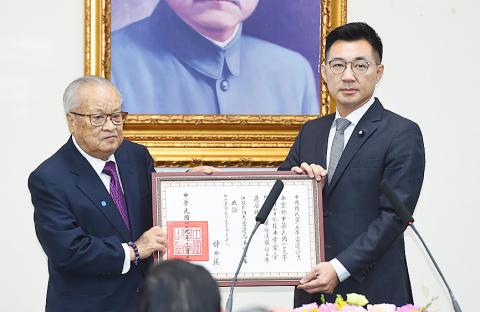Chinese Nationalist Party (KMT) Legislator Johnny Chiang (江啟臣) pledged urgent reforms as he was sworn in as the party’s new chairman yesterday.
“The end of the by-election is the beginning of unity,” Chiang said at his swearing-in at KMT headquarters in Taipei, which was attended by former president Ma Ying-jeou (馬英九), and former party chairmen Wu Poh-hsiung (吳伯雄) and Wu Den-yih (吳敦義), among others.
Saturday’s by-election was held to fill the vacancy left by Wu, who stepped down last month after the party’s losses in the Jan. 11 presidential and legislative elections.

Photo: Liao Chen-huei, Taipei Times
Chiang defeated his sole opponent, former Taipei mayor Hau Lung-bin (郝龍斌), by taking nearly 69 percent of the vote.
“I have always believed that what is needed between generations is dialogue and not confrontation; what is needed is cooperation and not conflict,” Chiang said, adding that as party chairman, he hopes to facilitate understanding and cooperation among different generations within the party.
The KMT’s defeats in the presidential elections in 2016 and this year “highlight that the party is behind the times in many aspects and urgently needs to catch up through reform and innovation,” he said. “We do not have any time to waste.”
“In an age of democracy, the KMT can no longer expect a wise leader to make all the decisions,” he said, adding that he would promote a collective leadership.
Chiang has proposed the creation of an 11-member “decisionmaking platform” within the party that he says would advise the chairperson and assist them in the decisionmaking process by presenting a diverse range of views.
Speaking on cross-strait policy, Chiang said: “My basic principle is to stick to the values of the Republic of China’s free and democratic system and strive for cross-strait peace and common well-being.”
While trust needed to be “rebuilt” between Taiwan and China, the KMT’s most important task at the moment is its own reform and transformation, Chiang said.
KMT Central Standing Committee member Lin Rong-te (林榮德), who served as acting chairman after Wu stepped down in January, said that the coming year would be key in determining whether the KMT can return to power.
Wu Poh-hsiung said that he “dare not say ‘congratulations’” to Chiang, given the task that lies ahead.
“This is not the attainment of power and status, but rather dedication and sacrifice for a difficult job,” he said.
Ma, who is also a former KMT chairman, said while he agrees that the party should first focus on reform, its position on Taiwan’s relationship with the world and with China should also be priorities.
Taiwan should have “close relations” with the US, “peaceful relations” with China and “friendly relations” with Japan, he said.
Chiang, 48, is a US-educated politician who entered politics in 2010 when he was appointed minister of the Executive Yuan’s now-defunct Government Information Office.
He has won a legislative seat in Taichung’s eighth electoral district for three consecutive elections beginning in 2012 and received more votes that any other KMT candidate in the Jan. 11 legislative election.
Additional reporting by CNA

The manufacture of the remaining 28 M1A2T Abrams tanks Taiwan purchased from the US has recently been completed, and they are expected to be delivered within the next one to two months, a source said yesterday. The Ministry of National Defense is arranging cargo ships to transport the tanks to Taiwan as soon as possible, said the source, who is familiar with the matter. The estimated arrival time ranges from late this month to early next month, the source said. The 28 Abrams tanks make up the third and final batch of a total of 108 tanks, valued at about NT$40.5 billion

Two Taiwanese prosecutors were questioned by Chinese security personnel at their hotel during a trip to China’s Henan Province this month, the Mainland Affairs Council (MAC) said yesterday. The officers had personal information on the prosecutors, including “when they were assigned to their posts, their work locations and job titles,” MAC Deputy Minister and spokesman Liang Wen-chieh (梁文傑) said. On top of asking about their agencies and positions, the officers also questioned the prosecutors about the Cross-Strait Joint Crime-Fighting and Judicial Mutual Assistance Agreement, a pact that serves as the framework for Taiwan-China cooperation on combating crime and providing judicial assistance, Liang

A group from the Taiwanese Designers in Australia association yesterday represented Taiwan at the Midsumma Pride March in Melbourne. The march, held in the St. Kilda suburb, is the city’s largest LGBTQIA+ parade and the flagship event of the annual Midsumma Festival. It attracted more than 45,000 spectators who supported the 400 groups and 10,000 marchers that participated this year, the association said. Taiwanese Designers said they organized a team to march for Taiwan this year, joining politicians, government agencies, professionals and community organizations in showing support for LGBTQIA+ people and diverse communities. As the first country in Asia to legalize same-sex

MOTIVES QUESTIONED The PLA considers Xi’s policies toward Taiwan to be driven by personal considerations rather than military assessment, the Epoch Times reports Chinese President Xi Jinping’s (習近平) latest purge of the Chinese People’s Liberation Army (PLA) leadership might have been prompted by the military’s opposition to plans of invading Taiwan, the Epoch Times said. The Chinese military opposes waging war against Taiwan by a large consensus, putting it at odds with Xi’s vision, the Falun Gong-affiliated daily said in a report on Thursday, citing anonymous sources with insight into the PLA’s inner workings. The opposition is not the opinion of a few generals, but a widely shared view among the PLA cadre, the Epoch Times cited them as saying. “Chinese forces know full well that